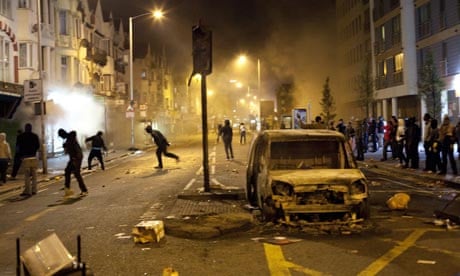The number of police dealing with 999 emergencies has fallen by more than 5,000 since the last general election, according to new figures that seriously undermine David Cameron's pledge to be defending "frontline" forces from spending cuts.
The figures, compiled from responses to freedom of information requests from all 43 forces in England and Wales, are a severe embarrassment to the government, which has insisted that its 20% funding cuts will not compromise public safety or the fight against crime.
Labour described the job losses among so-called "first responders" – those following up on 999 calls – as "shocking" and said they raised new questions about whether the public could trust the government.
Only last month Cameron told the Commons that the percentage of frontline officers was actually increasing. Ministers have claimed more officers are being switched to the "sharp end" as back office jobs go and police bureaucracy is reduced. But the new data, supplied by the forces themselves and verified independently by the House of Commons library, shows a fall of 5,261 in the number of officers defined as "first responders" between March 2010 and December last year.
Her Majesty's Inspectorate of Constabulary defines "first responders" as those responding to 999 calls, attending traffic accidents and being first at the scenes of crime and other incidents such as public disturbances.
Of the 43 forces, 23 have so far only submitted figures up to March last year in their FOI responses, meaning that, when all the figures are in, the total is likely to be significantly higher.
Among forces that have suffered the biggest culls of 999 officers are Devon and Cornwall, which lost 540 "first responders" (25% of its total), and West Midlands, which lost 1,023 (19%).
Paul McKeever, chairman of the Police Federation, which represents 135,000 officers, said the impact of the cuts would raise questions about the police's ability to contain events such as last summer's riots. "It puts more pressure on those who are left. In particular, those involved in responding are stretched and it puts their safety on the line," he said.
"It also impinges on the public's safety. We keep getting the same mantra from government, that it wants to concentrate on crime, that it's a core responsibility, and that's sending one message to the public. The message is that they expect us to do everything, which cannot be right. We have to acknowledge that, with cuts of between 20% and 32%, we cannot do more with that much less."
Yvette Cooper, shadow home secretary, whose office made the freedom of information requests, said: "Time and again the government has promised us the frontline will not be cut but now we see very clear proof that the very officers that need to respond to 999 calls, that need to respond to emergency incidents, are disappearing. To lose thousands of the very officers that you need in an emergency will be deeply worrying for people right across the country. People need to know that the police will be there when they need them."
A Home Office spokesman said: "These are not official figures and we don't recognise them. The reality is independent reports have shown police can reduce costs while protecting the frontline and, according to official statistics and police plans, the proportion of officers on the frontline is rising.
"We've reversed the policies of the past to get police out of back-office roles and back on the streets. Official figures show that since March 2010 we've seen 500 more officers on the frontline as work is done across all 43 forces to reduce the more than 23,500 warranted police officers in backroom posts."
The FOI submissions are certain to catapult the issue of policing and crime to the top of the political agenda, after the latest British Crime Survey figures showed personal crime – including theft, robbery and violence – had gone up by 11% since last year, the steepest rise for more than a decade. The home affairs select committee raised concerns last year about the effects that £2bn of cuts a year would have on the service and on crime levels. The committee also raised concerns that the biggest savings were to be made in 2012-3 – when police authorities would be replaced with police and crime commissioners, and when there would be additional pressure on forces nationwide due to the 2012 Olympics.
Last year the police minister, Nick Herbert, said: "We believe that by controlling costs, cutting bureaucracy, making savings in force back and middle offices, and improving productivity, the police service for the public can be maintained and improved even as funding is reduced."
Other ministers have repeatedly said that crime and police effectiveness "do not depend on numbers".
Cooper said that policing could well become as big a political crisis for the government in the runup to the next election as the NHS. Like the NHS, the government was about to impose massive and unwelcome reform on a service that the public believed had improved, even at a time of massive spending cuts.

Comments (…)
Sign in or create your Guardian account to join the discussion